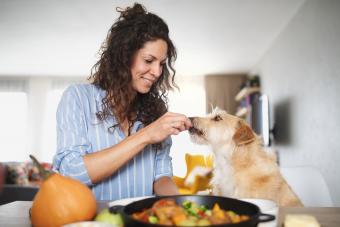
Have you ever wondered if it's safe to give to your dogs rawhide? Dogs certainly love them, but vets and pet owners alike seem divided about whether these chew treats are really a good choice for pets. Along with the potential hazards, there are some benefits. Discover how you can choose the safest rawhides for your dog to keep them out of harm's way.
What Are Beef Hide and Rawhide Chews?
Both beef hide and rawhides are made from the inner layer of an animal’s skin, also known as the hide. This skin is often flavored, then dried and braided, twisted, or formed into other shapes. The difference between beef hide and rawhide is that beef hides are always made from cattle, but rawhides come from other animals, like pigs or buffalo. In other words, all beef hides are rawhides, but not all rawhides are beef hides. Both are sold as chew treats for dogs and have similar safety precautions.
Choosing a Safe Rawhide Chew
If you're interested in giving your dog a chew or you already know they adore them, there are a few precautions you should take to ensure your pet's safety while they enjoy this treat.
- Only give your dog a chew when you can be around to keep an eye on them.
- Choose a granulated rawhide chew whenever possible. These usually pose the least choking hazard because the hide has already been crumbled up and compressed back together.
- The larger, the better. Make sure the chew is large enough that your dog can't fit it completely into their mouth.
- Keep two chews on hand and trade them when one becomes too soft. The hide will harden as it dries, and you can give it to your dog again when the other chew becomes soft.
- If the chew becomes excessively dirty, just throw it away.
- Replace your dog's chew when they have whittled it down far enough to fit in their mouth.
Tendon chews are much easier for dogs to digest, so they're usually a safer option than rawhides and beef hides.
Benefits of Rawhide Chews

Rawhide chews can provide some benefits for your dog.
- As your pet chews, the hide scrapes away tartar and calculus where harmful bacteria like to hide. This reduces your dog's chance of developing gum disease and tooth loss.
- Rawhides also give your pet a chance to exercise their natural chewing instincts on an appropriate item versus your table leg or favorite pair of loafers.
- Chewing can be a great stress reliever, so it's important to supply your dog with safe chew toys and bones.
Hazards Associated With Rawhide Chews
There's a lot of controversy around feeding rawhides because of their numerous downsides. Rawhide and beef hide chews can present a choking hazard if a dog isn't supervised while chewing one. As your dog chews and slobbers on his treat, the hide becomes rehydrated, soft, and gooey. When it reaches this point, your dog is able to tear away sections from the main treat.
Most of the time, your pet will simply eat small pieces of the hide treat, and it will pass through his digestive system without a major event. But in some cases, your pup might be in danger of these hazards.
- Large chunks may be too big to swallow and cause a dog to choke; you may need to then save the choking dog.
- The hide can become lodged in a dog's teeth and require an owner's assistance to remove it.
- Your dog could swallow a larger chunk of the hide, which could become lodged somewhere along the intestinal tract, and surgery may be required to remove it.
Rawhide chews are not easily digestible, which is why they can get stuck in your dog's intestines.
Toxin Exposure
Beef hide and rawhide chews can contain trace amounts of toxins, as well as E. coli or Salmonella bacteria. This can be harmful to the pets that chew them, as well as the people that handle the chews. People with immune deficiencies should be especially careful to wash their hands after handling a chew.
Consult Your Vet About Rawhides
While you're weighing the benefits of rawhide against the hazards, don't hesitate to consult your vet for a professional opinion. Your vet may be able to share some first-hand experience about the potential problems these chews can cause, and just how likely it is that they could become hazardous to your pet. As with all things, moderation is also important. Offering your dog an occasional piece of rawhide is probably fine, but don't make these chews a steady diet.







